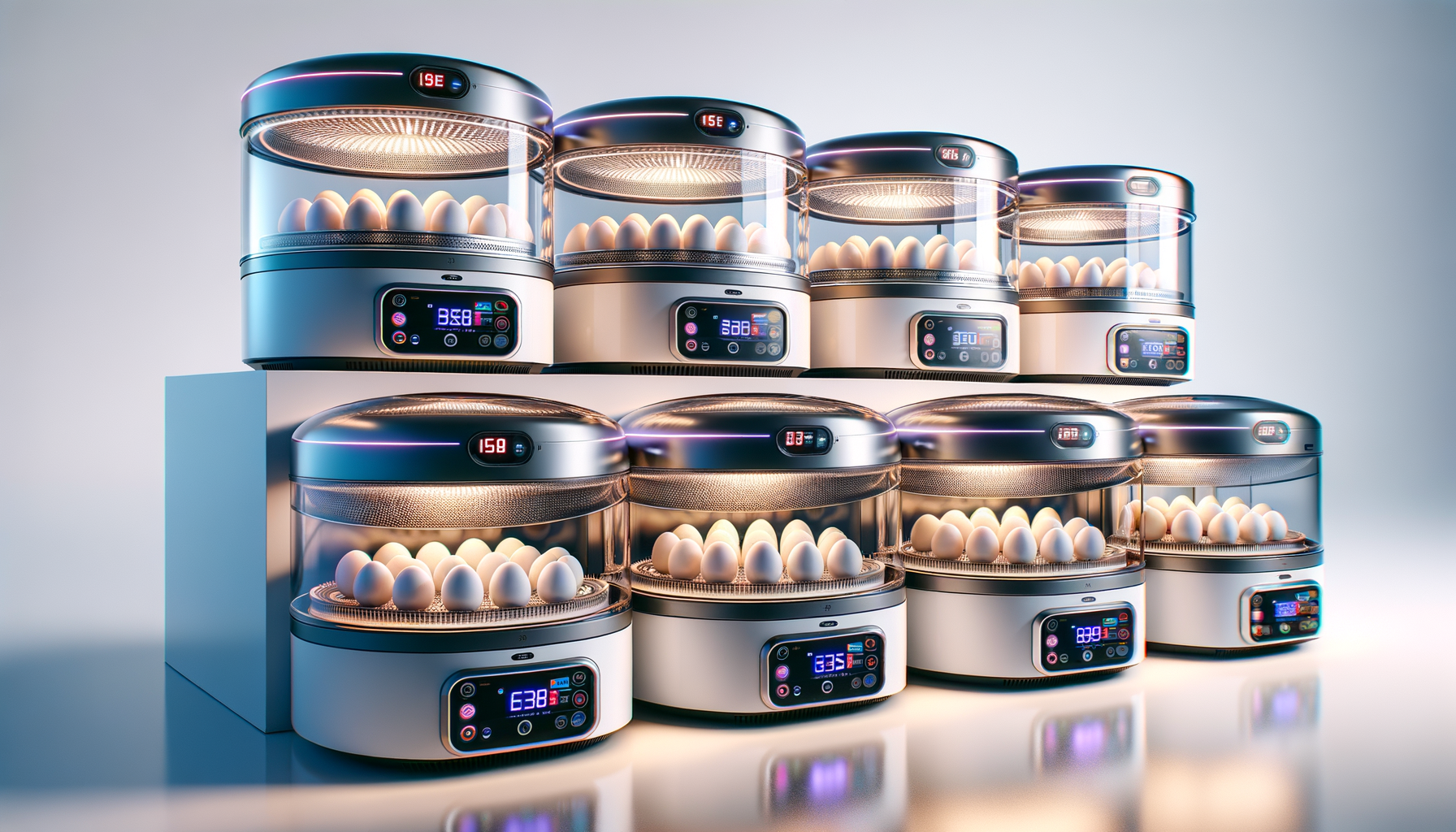
Are you looking to start incubating your own eggs and wondering which egg incubator is the best investment for your hatchery dreams? Whether you’re a seasoned farmer or an enthusiastic hobbyist, the right egg incubator can make all the difference in successfully hatching chicks. The process of incubation can be quite delicate, and the right device ensures that critical conditions such as temperature and humidity are consistently maintained. Let’s explore some of the best egg incubators on the market to help you hatch your eggs more effectively.
Our Top Picks
Our #1 Top Pick: Brinsea Products Mini II Advance Automatic 7 Egg Incubator
The Brinsea Mini II Advance is a compact, user-friendly option for small-scale hatchings. It is an automatic incubator with room for up to 7 eggs, perfect for hobbyists or small operations. This incubator takes much of the guesswork out of the incubation process with its digital control system that manages temperature and turning intervals. The Mini II Advance has excellent visibility, allowing you to keep an eye on the eggs without opening the lid and risking temperature fluctuation. Its proven reliability and ease of use make it an excellent choice for beginners.
Pick #2: Harris Farms Nurture Right 360 Egg Incubator
The Harris Farms Nurture Right 360 is an innovative design that allows for 360-degree visibility, meaning you can see the contents from every angle. Its capacity is larger than the Brinsea, accommodating up to 22 eggs. It boasts an automatic egg turner, built-in LED candler for embryo development monitoring, and precise temperature and humidity control — making the incubation process a breeze. The 360’s performance is noteworthy for those who are serious about hatching but not quite running an industrial operation.
Pick #3: VIVOHOME Digital 9-12 Egg Incubator
For those looking for a mid-range option, the VIVOHOME Digital Incubator is a wise choice. With its moderate capacity, it holds between 9 to 12 eggs, depending on size. This model features a digital control panel to monitor temperature and humidity easily, and it is suitable for a variety of egg sizes including chicken, duck, goose, and more. Its clear window design allows you to watch the entire incubation process without interruption. If you’re after simplicity with a bit more capacity, this could be your go-to incubator.
Pick #4: Farm Innovators Model 4250 Digital Circulated Air Incubator
Farm Innovators Model 4250 comes with a built-in egg candler and an egg turner that can hold up to 41 eggs, which makes it great for larger projects. Its integrated fan pulls in fresh air to stabilize the temperature and improve hatch rates. The digital display shows temperature, humidity, and days to hatch – a countdown to excitement for hatching enthusiasts! This is a solid option for a more semi-professional setting or for teachers and scientists conducting life-cycle studies in classrooms or labs.
Pick #5: Magicfly Digital Mini Fully Automatic Egg Incubator
Last but not least is the Magicfly Digital Mini Incubator, which is fully automatic and can hold up to 12 eggs. Its compact size and simple controls make it an ideal choice for beginners or those with limited space. Despite its small size, it still includes features like temperature control and automatic egg turning. Its budget-friendly price tag doesn’t hurt, either. Perfect for someone just dipping their toes in the world of egg incubation.
What to Know Before You Buy
- Capacity – How many eggs do you plan to incubate at any given time? Choose an incubator that can accommodate your needs.
- Temperature Control – Stable and accurate temperature control is crucial for successful hatching.
- Humidity Control – Humidity levels must be precise; too high or too low can be disastrous.
- Automatic Egg Turning – Eggs need to be turned several times a day; an automatic feature can save you time.
- Visibility – Clear windows or viewing areas are beneficial for monitoring without disturbing the eggs.
- Durability – A well-constructed incubator can last many hatching seasons, so choose a sturdy machine.
Factors to Consider Before Buying
- Types of Eggs – Ensure the incubator can handle the types of eggs you’re working with (e.g., chicken, duck, reptile).
- Power Source and Consumption – Make sure you have the correct power source and consider the energy efficiency of the incubator.
- Ease of Cleaning – You’ll need to clean the incubator between uses; simple designs are easier to sanitize.
- Reliability – Look for trusted brands with good warranties and customer service track records.
- Additional Features – Consider if extras like built-in candlers or automatic humidity control are worth the investment for you.
- Budget – Weigh the cost against the features and the anticipated frequency of use.
Why Trust ChooseRight?
At ChooseRight, we dedicate considerable time to researching and evaluating the products we recommend. Before compiling our top picks, we’ve scoured through thousands of reviews and reached out to professionals in the field for their insights. The experience of actual users and the knowledge of industry experts give us a well-rounded view of each product, ensuring you receive trustworthy and accurate information to make the best purchase decision for your needs.
Finishing Thoughts
In conclusion, finding the best egg incubator is all about understanding your specific needs and choosing a product that addresses them effectively. From digital controls to automatic turners, each of our top picks offers unique advantages suited to different types of incubation projects. Keep in mind that successful hatching is a combination of the right equipment and diligent attention to detail. We hope this guide helps you in your quest for the perfect hatch and brings you one step closer to witnessing the miracle of new life.
Frequently Asked Questions
What is the best egg incubator for home use?
The best egg incubator for home use depends on the size of your hatchery, your budget, and specific features you require, such as automatic turning or humidity control. Popular brands often have models that are well-suited for hobbyists and small-scale farmers.
How do you use an egg incubator?
To use an egg incubator effectively, you need to set it up according to the manufacturer’s instructions, place the eggs inside, turn them regularly if the incubator doesn’t do this automatically, and maintain the correct temperature and humidity levels until the eggs hatch.
How long does it take to hatch eggs in an incubator?
The incubation period varies depending on the species of bird. For example, chicken eggs typically take 21 days to hatch, while duck eggs can take around 28 days. Always refer to species-specific guidelines for accurate hatching times.
What temperature should an egg incubator be set at?
Most egg incubators should be set to maintain a temperature of around 99.5°F (37.5°C) for forced-air incubators or 102°F (38.9°C) for still-air incubators. These temperatures provide the necessary warmth for embryo development, but you should always confirm with the manufacturer’s or breed-specific recommendations.
How often should eggs be turned in an incubator?
Eggs should be turned at least three to five times per day to prevent the embryo from sticking to the eggshell. Many incubators come with automatic turning features. If you’re turning eggs manually, it is best to turn them an odd number of times per day to ensure that they don’t rest on the same side for two consecutive nights.
Can you open the incubator during incubation?
While it’s generally advisable to minimize the opening of the incubator to maintain stable temperature and humidity, brief openings to turn eggs or add water for humidity are often necessary. Avoid opening the incubator during the critical final days of incubation when the chicks are positioning for hatching.
What is the purpose of humidity in an egg incubator?
Humidity in an egg incubator prevents the eggs from drying out and helps to soften the shell for the hatching process. Humidity levels are typically kept between 40-50% during incubation and increased to 65-75% during the final days before hatching.
Is it better to choose a manual or automatic egg incubator?
Whether a manual or automatic egg incubator is better depends on your time, experience, and personal preference. Automatic incubators tend to be more convenient and are especially useful for larger operations or if you’re unable to manually turn the eggs several times a day.
How do I know if my incubator is working correctly?
To ensure your incubator is working correctly, use a reliable thermometer and hygrometer to monitor internal temperature and humidity closely. Look for consistent readings and make sure the automatic turners (if present) are functioning. Observe developing embryos with candling to check for progress.
Can I incubate eggs from different species at the same time?
While it is possible to incubate eggs from different species at the same time, it’s generally not recommended because each species may require different temperatures, humidity levels, and incubation periods, which can complicate the process and reduce hatch rates.







